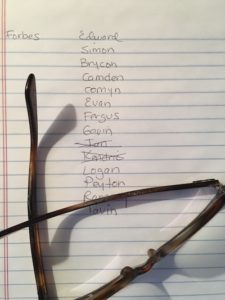
Names are how we identify things — people, places, things, etc. For the purposes of this blog, I’m going to concentrate on the names we give to the characters in the stories we write. I have found that choosing a name is quite an undertaking, and it’s one that should not be taken lightly!
A Visual Fit
My character’s name needs to fit the physical body I’ve created in my mind. A tall, muscular man needs to have a name that reflects how he looks. The name Louie won’t work for me, but Gavin or Marcus are better choices in my mind. Of course, Louie could be a nickname that the character has, so that’s a possibility. Even then, Louis isn’t the name that jumps out at me when I create a mental picture of my hunky character. Toss potential candidates around, and you’ll find one that your character is comfortable with.
Time/Place
What about the time period of your story? Contemporary names may not fit if your story is set in 14th century Scotland, like mine is. For an authentic feel, I researched names that were popular in that location and time period. I had the surname that I needed to use (Forbes), so that narrowed the field. I needed to find a first name that sounded like it belonged to the last. This part took a while. I ended up making a list of potential candidates and let them percolate for a day or so. I immediately saw a couple that were too close to the characters in a just-completed series, so they were out. I read them out loud, trying them out with my voice. That narrowed the field again.
Personality
A person’s name needs to fit the personality you create for them. If you have a strong-willed, female character, you don’t want to give her a soft, timid name. The only exception I can think of is if you want to surprise your audience by the contrast of her name to her character. That’s up to you, the writer. My own, personal opinion is that I like my readers to have a solid, firm grasp of my characters, knowing that their name represents who they are, inside and out.
Meaning
Does the name you’re considering have a specific meaning attached to it? In my Gaelic research, Reid means “red-haired.” Although I like the name, my main character has a dark complexion and black hair, so that name gets crossed off for him but can be saved for a secondary character. Gilmore, which means “sword-bearer” would be better for him and the role he plays in my story. You may or may not choose to reveal the meaning behind the name in your story, but it’s helped me find a name that fits on another level.
Some names come to me immediately (chosen by the character?) while others are more elusive and involve more effort and research to determine. If I’m having trouble attaching a name to a character, I give it time to evolve and find its way to its rightful place. Somehow, I know when I have the right name. It feels right to me, and I see my characters’ chests swell with pride at the name I’ve chosen for them.

Erwin Wunderlich
Once, my editor ran me through the ringer on my novel’s character names. She was interested in the number of syllables in the various names. “Too many one syllable names, or too many two syllable names!” she would say. So I changed the names accordingly.
ken pelham
I wish I’d paid more attention to one relatively minor character in one novel. I gave her a rather bland name, but she grew on me and now she’s the principal character in a work-in-progress.
BJ Phillips
I’ve found myself giving too many characters names that either sound alike or start with the same first letter. Now I watch for that.
Shutta Crum
Good article. I, too, have to watch out for names that start with the same letter. I get in a rut. The other thing is that if you are writing for young readers you don’t want to give your antagonist a common name that a lot of other kids may have. You don’t want a young reader shamed by being compared to someone evil, misunderstood, or too whacky. I try to keep this in mind, as well.
Amarilys Rassler
Thank you!
Suzanna Crean
Miss Scarlett’s original name was Pansy. Can you imagine?